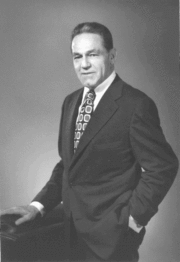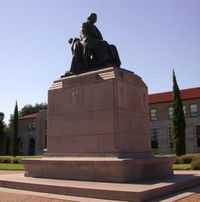Norman Hackerman passed away this weekend.
He was 95, the same age as Rice University, my alma mater. Dr. Hackerman (known to many students as "The Hack") was President of Rice during my years there, and for some time after. He had what you might call Ronald Reagan hair, and I had no idea he was nearly 65 when I knew him.
The Rice of the mid-1970s was very different from today’s institution. It was an engineering school, a proud tool of Big Oil. The football stadium was the best-known building on campus. The "statue" of founder William Marsh Rice in our quadrangle was actually a rip-off of the John Harvard statue. It was a pretentious, silly place.
Petroleum engineering and chemical engineering were big majors. Hard sciences, not so much. Liberal arts (my degrees were in political science and history) even less. Fine arts hardly at all.
Dr. Hackerman changed that. He did more than hire Dr. Richard Smalley. He cajoled budget funding for hard sciences. He encouraged faculty, and even undergraduates, to believe hard science was still relevant. He transformed people without touching them.
Dr. Hackerman had been a chemist, and even worked on the Manhattan Project, but he made his mark as an administrator at the University of Texas, where he rose through the management ranks until he ran the place.
Then he didn’t. And when Rice made the mistake of trying to make one of its own President, in 1969, Hackerman was available. We grabbed him. He seemed the safe, conservative choice. In some ways he was, but in others he was anything but.
Dr. Hackerman was a natural politician of the old school. He had simple
aims — more — and transformed this simple agenda into a greater good.
He then managed to get buy-in for this greater good from people who, at
the time, seemed to have nothing in common — radical faculty,
radical-right funding sources, students. He got them to all give a
little, enough so they could somehow tolerate themselves, in the name
of moving forward, getting bigger, raising money, building buildings,
hiring "name" faculty. And in his early days at Rice, the only thing
that made many of these new hires "names" was that Hackerman knew
theirs. So he was also a talent scout. He was ingratiating, he was
gracious, and to those who wrote the big checks he was sincere,
non-threatening, and conservative. His presence defined the word stewardship.
Dr. Hackerman’s great academic love was chemistry, and in the 1970s it
seemed a harmless affectation. It wasn’t where the money came from, it
was where the money went. To many at that time, the combination of
discrete atoms into molecules seemed a dead-end, a Tinkertoy game. But
Dr. Hackerman believed there was much more there.
And he was right, as few in academic history have been right about anything.
Dr. Hackerman also took Rice’s chief weakness, its small size, and
turned it into its greatest strength. This is an even more incredible
achievement, given that he had made his name at UT-Austin, one of the
world’s first great "multiversities," a ginormous, heavily-endowed
mishmash with more agendas than the United Nations.
Rice was too small to have separate fiefdoms, and Dr. Hackerman
encouraged a multi-disciplinary approach. That is, computer geeks might
work with chemical engineers might work with chemists and physicists.
Professors might work with undergraduates as well as graduate students.
Once you were "inside the hedges" you were part of the team, capable of
anything. You could be what you wanted.
What I wanted to be was a journalist. But lots of people went into Rice
wanting to be one thing and came out something else, something better.
Norman Hackerman went into his career wanting to be a research chemist,
not an administrator, not a politician. What he became, instead, was a
builder.
Today’s Rice University is what Dr. Hackerman set it out to become. His
successors have added to the vision, have rounded it out in many ways,
but it’s The Hack who really deserves the credit. He made its
weaknesses strengths, he made it the leader it had previously only
pretended to be, and he deserved every accolade he ever got in his
long, long life.













I was lucky enough to get in Dr. Hackerman’s section for my freshman chemistry course at the University of Texas in the fall of 1964. What an amazing teacher he was! He actually made what was a pretty scary course for most freshmen into an enjoyable, even fun, experience. He loved to give demonstrations as part of his lectures. Sometimes it was like taking chemistry on the set of The Price is Right — he would bring students up onto the dais with him for some demos. I once saw him walk up the aisle, lecturing all the way, to the back of the room where a student was dozing behind a copy of The Daily Texan — when he got there, he pulled out his lighter, set the kid’s newspaper on fire, and walked back down to the dais, never missing a beat in the lecture. He would throw things to (or at) students during the lectures (his aim with a piece of chalk was deadly from twenty rows away). Not many people slept during his classes, though — too much going on down at the front of the room. He was truly impatient with the University’s bureaucracy (this was before he was President), and used to do things like use the curtains in the lecture room to erase the whiteboard, because the school had not budgeted for erasers. I wish that all of my professors had been as engaging and passionate about what they were doing as Norman Hackerman was. I am so sorry to hear that he passed away, but he surely lived a full life every moment of his 95 years.
I was lucky enough to get in Dr. Hackerman’s section for my freshman chemistry course at the University of Texas in the fall of 1964. What an amazing teacher he was! He actually made what was a pretty scary course for most freshmen into an enjoyable, even fun, experience. He loved to give demonstrations as part of his lectures. Sometimes it was like taking chemistry on the set of The Price is Right — he would bring students up onto the dais with him for some demos. I once saw him walk up the aisle, lecturing all the way, to the back of the room where a student was dozing behind a copy of The Daily Texan — when he got there, he pulled out his lighter, set the kid’s newspaper on fire, and walked back down to the dais, never missing a beat in the lecture. He would throw things to (or at) students during the lectures (his aim with a piece of chalk was deadly from twenty rows away). Not many people slept during his classes, though — too much going on down at the front of the room. He was truly impatient with the University’s bureaucracy (this was before he was President), and used to do things like use the curtains in the lecture room to erase the whiteboard, because the school had not budgeted for erasers. I wish that all of my professors had been as engaging and passionate about what they were doing as Norman Hackerman was. I am so sorry to hear that he passed away, but he surely lived a full life every moment of his 95 years.